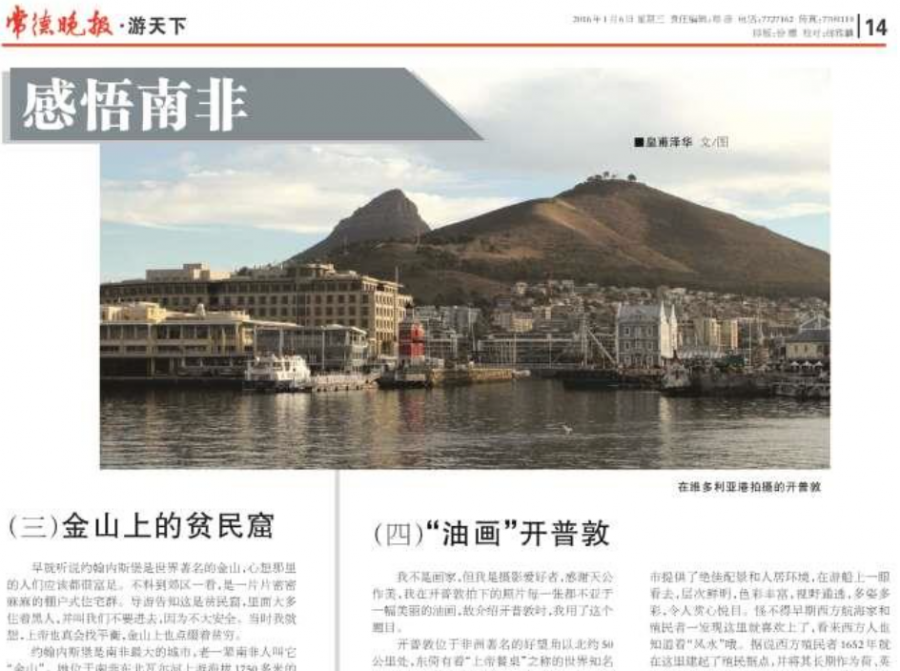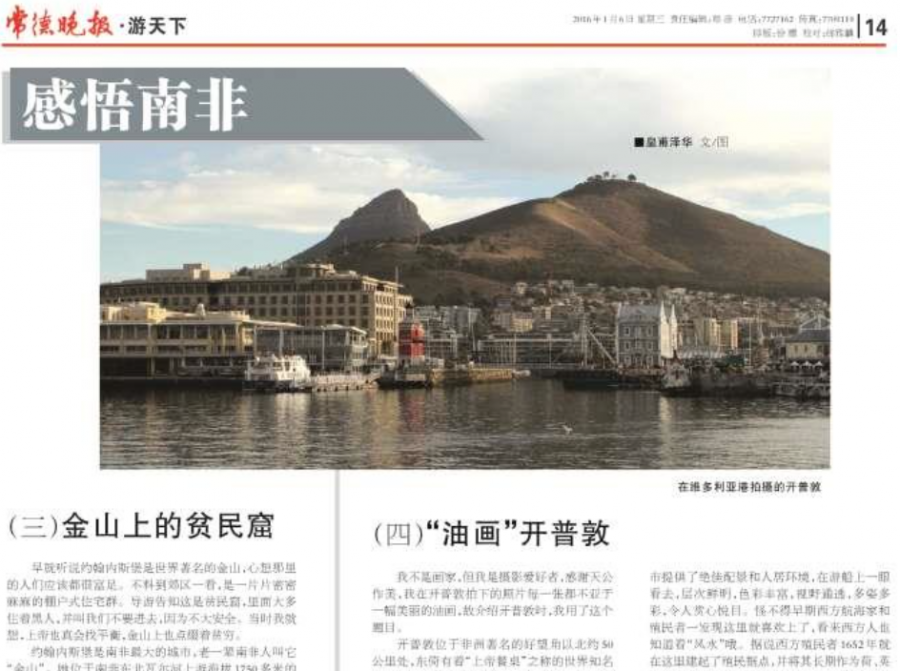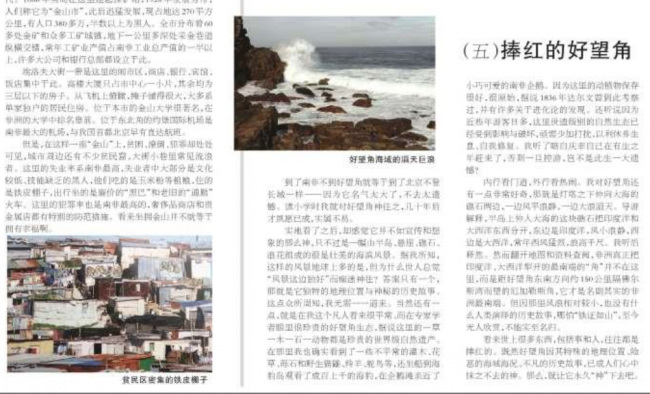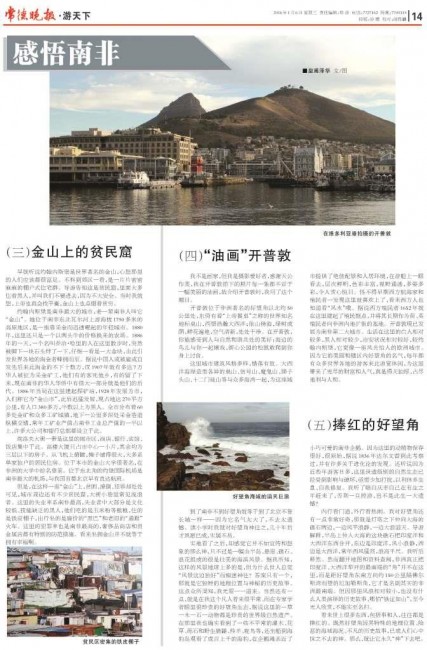
What Three Chinese Journalists Have to Say About South Africa
In a new series out of Wits University about how Africa is covered in Chinese newspapers, Barry van Wyk looks at three journalists writing in January 2015 about visiting South Africa. Their trips left them with “decidedly mixed impressions”. One shows (“with obscure statistics”) that South Africa is the third most dangerous country for Chinese people. The other stories look […]

In a new series out of Wits University about how Africa is covered in Chinese newspapers, Barry van Wyk looks at three journalists writing in January 2015 about visiting South Africa. Their trips left them with “decidedly mixed impressions”. One shows (“with obscure statistics”) that South Africa is the third most dangerous country for Chinese people. The other stories look at a man held as a slave in Johannesburg, the popularity of the Voortrekker Monument, and a mysterious death in Limpopo.
Johannesburg Bad, Cape Town Good
On 6 January Changde Evening News, a newspaper published in the city of Changde in Hunan province in southern China, ran a full-page report “Appreciating South Africa” in their Travel the World feature. Author Huangfu Zehua visited Johannesburg and Cape Town, and his contrasting impressions of the two cities is clearly expressed in the choice of images (see image below): Apprehension and disappointment at Johannesburg’s slums and vagrants, and an epiphany in picturesque Cape Town.
In his first segment the author describes his disappointment and disillusionment when he arrived in the City of Gold; he had always thought, he writes, that people living in the famous Witwatersrand (in Chinese Jinshan, literally “mountain of gold”) must all be affluent. Instead, to his great surprise what he found instead were densely packed shack dwellings. Staring at this Jinshan adorned with poverty, where – as informed by his tour guide – mostly black people live and it’s not safe to go – he had an interesting thought: “God will find true balance…”

Huangfu identifies Eloff Street as the place where the shops, hotels and restaurants are in the CBD, and the skyscrapers take up a disappointingly small area. Wits University close by is a quite renowned African University, he concedes, and there’s an international airport to the northeast where you can fly straight to Beijing. But as for the rest,
…on this “mountain of gold”, poverty, dejection, and criminality can be seen everywhere. There’s more slum housing on the periphery of the city, and vagrants can often be seen in the streets and alleys.
“Such a place with the name Jinshan (mountain of gold) seems not to have the same measure of happiness.”
Following this glib dismissal, the author provides his readers with a few further observations about central Johannesburg:
- It has the country’s highest jobless rate
- Most of these jobless have a low level of cultural development
- There are blacks lacking technical skills
- The blacks eat a form of cornflour maize porridge
- They live in corrugated iron shacks
- When they go out they make use of low-cost unlicensed taxis and old-style commuter trains
- It has the country’s highest crime rate, and luxury goods stores and jewelers have special security measures in place.Unsurprisingly, he ends his segment on Johannesburg with the quip, “Such a place with the name Jinshan seems not to have the same measure of happiness.”As soon as the author reached Cape Town, however, the disappointment of Johannesburg was overtaken by euphoria at this city where every picture he took was “like a beautiful oil painting”. In the next segment and another, he marvels at Table Mountain (“God’s table”), the Cape of Good Hope, the lush flowers and trees, and the clean air and relatively safe environment (unlike the vagrant infested Johannesburg). In Cape Town, he gushes, you can feel the beauty of the harmonious coexistence of humanity and nature: On the seaside the birds frolic with you, and in the city parks the squirrels dare come right up to you asking for food.
No wonder early western colonialists and sailors loved this place, he writes, “it seems they must have known how to look at ‘feng shui’”. The Cape of Good Hope, he concludes, this geographical location with an extraordinary history where menacing oceans meet, will inevitably deposit something of the divine in your heart. But Johannesburg – best not mentioned really.
Pretoria’s Voortrekker Monument, a Hit with Chinese Tourists
On 5 January Zhanjiang Evening News from Guangdong province published a report by journalist Deng Cheng, who visited the Voortrekker Monument in Pretoria, which he describes as the largest and one of the most popular tourist attractions in South Africa. Or at least it is becoming very popular among Chinese tourists, because Deng relates the high opinions of the monument among Chinese tour groups that have visited it, and mentions the monument’s impressive new Chinese-language website and brochures.
Having visited the monument himself Deng was likewise impressed by the Chinese brochures, and he relates that they state that the monument was erected to commemorate the “foray in early times of the intrepid Voortrekkers into the interior”. Deng proceeds to describe the monument in detail, including the granite statues and carvings, the halls and exhibitions, as well as the surrounding nature reserve and the various types of animals to be observed there. “The overall structure and imposing grandeur of the monument”, he writes, “cannot but leave a deep impression on each visitor”.

Source: China African Reporting. South Africa a Perilous Place for Chinese Residents
On 4 January Yangzhou Evening News from Jiangsu province on China’s east coast reported somberly of certain unspecified “statistics” which show that South Africa became a more dangerous place in 2015 for Chinese people living there.
The newspaper neglects to cite the source or author of the statistics, but nevertheless the statistics indicate that persons living in countries outside China suffered 15 percent more safety concerns in 2015 compared to 2014. There were 483 such occurrences in 2015 (up from 436 in 2014), or 1.7 per day, and most of these cases involved robbery. The three leading countries in which Chinese people suffered such incidents in 2015 were the USA in first place, followed by Malaysia, South Africa, Italy, and Argentina. But South Africa, the article states, has a special reputation for robberies in which Chinese people are murdered: 10 Chinese persons were violently murdered in South Africa in 2015.
Another death of a Chinese shop owner was reported in January. On 14 January Eastern Express, likewise from Fujian province, published a report also sourced from local Chinese South African media. On 11 January, a Chinese shop owner in Musina in Limpopo province was found dead in his second floor bathroom above his shop, next to a gun, with a bullet wound in his temple. On the morning of 11 January, the shop was open as usual, but the owner was nowhere to be seen, and the bathroom was locked. Finally at 1 pm the police were able to gain access to the locked bathroom, where the body was discovered. Yet no-one in the surrounding area had heard any gunshot or commotion, and there was no sign of forced entry.
Seven months a slave in Johannesburg
On January 10 Fuzhou Evening News from Fujian province published a report sourced from Nanfei8.com, a portal for Chinese people living in or interested in South Africa, about Mr Zhu’s unintended visit to South Africa.
As Fuzhou Evening News relates the story, in May 2015 Mr Zhu and a few friends visited Mozambique for a tourist trip, although Mr Zhu also wanted to check out the local wood business. He stayed at the house of a friend in Maputo, but one day when we was walking along the street out to buy some daily necessities, when someone suddenly pulled a bag over his head, beat him semi-conscious with a stick, and shoved him into a van.
When he came to again he had lost all sense of time, not knowing how long he had been unconscious. He was in a pitch dark room, out of which a “wicked Asian face” appeared, who spoke and said to him: “This is Johannesburg, the world’s most chaotic place. No-one will know if you live or die, and if you want not to be beaten, you must work hard”.
So the next day he was put to work, cleaning and cooking in a small plastics factory, with four other Asian men and some black men, none of whom he was allowed to talk to. And so it went on for seven months, when early one morning on 5 January Mr Zhu found an opportunity to escape when the door was left unlocked. He ran down the street, but was unable to communicate with anyone as he spoke no English. Eventually he found a police station, but here too he was unable to make himself understood. Finally, the police accompanied him to a Chinatown in the city, and he was able to explain what happened, and his ordeal was finally at an end.
This article was first published by the Wits China Africa Reporting Project and is republished here with kind permission.